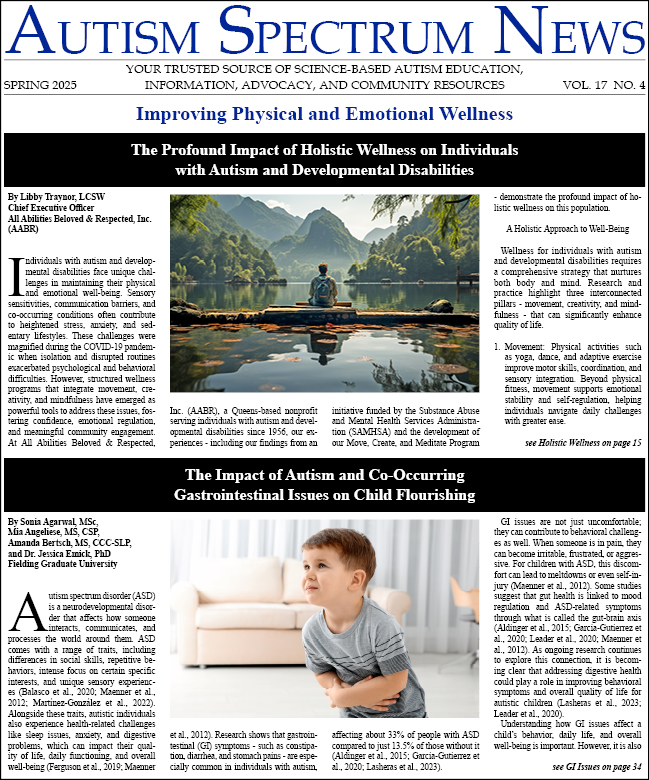-
Strategies for Autistic Adults to Achieve Greater Independence and Well-Being
The transition from childhood to adulthood can be a scary and difficult life experience for most people. It can be even more challenging for those diagnosed with autism and their families. This phase of life brings a blend of excitement and uncertainty, and the road to achieving greater...
-
Fostering Independence for Young Adults with Autism and Low Vision
VanBergeijk and LaVoie (2024 April & January) established in previous issues of Autism Spectrum News that “autism is the most commonly reported co-existing developmental disorder in children with blindness and other severe visual impairment.” They highlighted the need for a proper...
-
Supporting Autistic Adults: Am I College Ready?
Am I college ready? Such a question drew the attention of high school senior students in college readiness sessions at AHRC New York City’s Middle/High School. College readiness encompasses academic, social, and emotional learning support for students with autism and intellectual disabilities to...
-
Supporting Young Adults: Transitioning to Post-Secondary Educational Opportunities
This fall, I dropped my oldest child off for his junior year of college. For our family, this is always a time of excitement, but also one of trepidation. The transition from high school to higher education, from childhood to adulthood, is full of new and evolving challenges. Those challenges are...
-
Aging with Autism: Innovations for Independent Living to Address the Housing Crisis
At the beginning of the COVID pandemic, a friend came down with a particularly bad case of the virus which required emergency transport to the hospital. Laying on the gurney in the back of the ambulance she panicked as they placed the oxygen mask over her face. The EMS workers were frustrated with...
-
Helping Autistic Individuals Navigate Barriers to Adulthood
An adult on the spectrum can accomplish or achieve everything his/her/their cohort who is not on the spectrum has accomplished or achieved, and yet not be rewarded with that same level of independence and autonomy for his/her/their efforts (Cheak-Zamora, Tait & Coleman, 2022). Although young...
-
Strategies for Navigating College for Students with Autism
College is a transformative period in a young adult's life, offering a platform for growth, self-discovery, and academic achievement. However, for students on the autism spectrum, navigating the challenges of college life can be particularly overwhelming. College students with autism spectrum...
-
Supporting the College-Bound Autistic Student: A Need for Better Transition Planning
For autistic individuals, success in college lies in an effective transition plan that acknowledges and addresses the increased challenges they will face as college students. According to a national study, 34% of autistic students who qualified for a post-secondary education program attended such a...
-
The Benefits of Postsecondary Transition Programs for Young Adults with Autism
Despite the Individuals with Disabilities Education Act (IDEA) ensuring every learner with a disability a free and appropriate public education (FAPE) and The No Child Left Behind Act holding schools accountable for their students' academic achievement based on how they learn (The National Center...
-
Foundational Strategies to Develop Independence
For individuals with a disability like autism, developing skills that foster independence is a critical part of one’s education. Yet, young adults looking to transition into adult life and their families may not know how to advance the process. Vista Life Innovations, a nonprofit along the...




